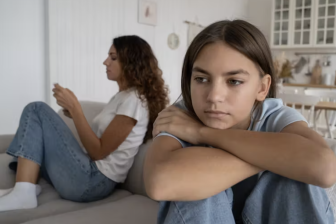
Family money worries from COVID policies hit mental health of US children in cities
Children’s mental health across US cities was significantly affected by the financial effects of pandemic containment polices.
And it is minimising these effects that will be key to protecting the wellbeing of youngsters if similar policies are ever needed in the future, according to a study by academics.
Children and their families in 21 cities were the subject of this latest research project carried out by joint teams across the US, who studied the relationship between school and financial disruptions to children’s sleep and mental health during the height of the COVID pandemic.
The study, published in research journal JAMA Network Open, took account of a variety of pandemic-related policies. Lead author Dr Dr. Yunyu Xiao, assistant professor of population health sciences at Weill Cornell Medicine, and investigators Timothy Brown, Lonnie Snowden and Julian Chun-Chung Chow from the University of California, Berkeley, studied just over 6,000 children aged 10-13 years old.
‘Financial disruptions to children’s sleep’
They used data from the government-funded NIH research arm’s Adolescent Brain Cognitive Development Study, a long-term look of child mental health, asking children and their parents and guardians about mental health and sleep between 2020 and 2021.
They also collected information on COVID-19 policy, COVID-19 incidence and unemployment rates to measure the relationship between children’s mental health outcomes and these factors during the pandemic.
What they found from speaking to the children was that financial disruption, such as a parent becoming unemployed or having their wages cut, was linked to an increase in stress, sadness, and COVID-19-related worry – but had no association with sleep.
School disruption was not associated with changes in mental health or sleep, surprising the researchers. One possible explanation for this unexpected result, said Dr Xiao, was that if children had more protective factors like increased parental care at home during lockdown, this would help with mental health.
“Children’s mental health and exposure to stress in early life may have a long-term impact in later life,” said Dr. Xiao. “Simultaneously, containment policies are necessary as an emergency strategy in a pandemic to prevent disease transmission.”
“We need to understand the impact of these policies on children’s mental health to better inform public policy and prepare for public health emergencies,” she said. “So, when we do have containment policies in place, we can mitigate their effects.”
This latest study builds upon previous work by Dr Xiao and Dr. J. John Mann, the Paul Janssen Professor of Translational Neuroscience (in psychiatry and radiology) at Columbia University, which found that that children’s psychological status was influenced by socioeconomic factors like access to health care, food insecurity and vaccination rates.
‘Children’s exposure to stress may have a long-term impact’
“Previous research has examined the associations of the COVID-19 pandemic on mental health, but little information has been published on its causal effects on children,” said Dr. Mann. “This study is the first longitudinal observational study in children to estimate bias-corrected associations of school and financial disruptions with mental health and sleep.”
Dr. Xiao said she planned to continue this latest research thread with a focus on those facing health disparities. She also highlighted the need for research on the impact of pandemic-related hate and racism on the mental health of Asian Americans, and is also keen to assess the impact of the COVID-19 policy on suicide and establish collaborations with community organisations to address social needs during a pandemic.
“We must not only take care of clinical needs but also study other factors that affect people,” she said. “To conduct the best science aimed at improving lives, we need to develop holistic public health approaches that go beyond treating biological causes of illness and addressing the social determinants of health.”




